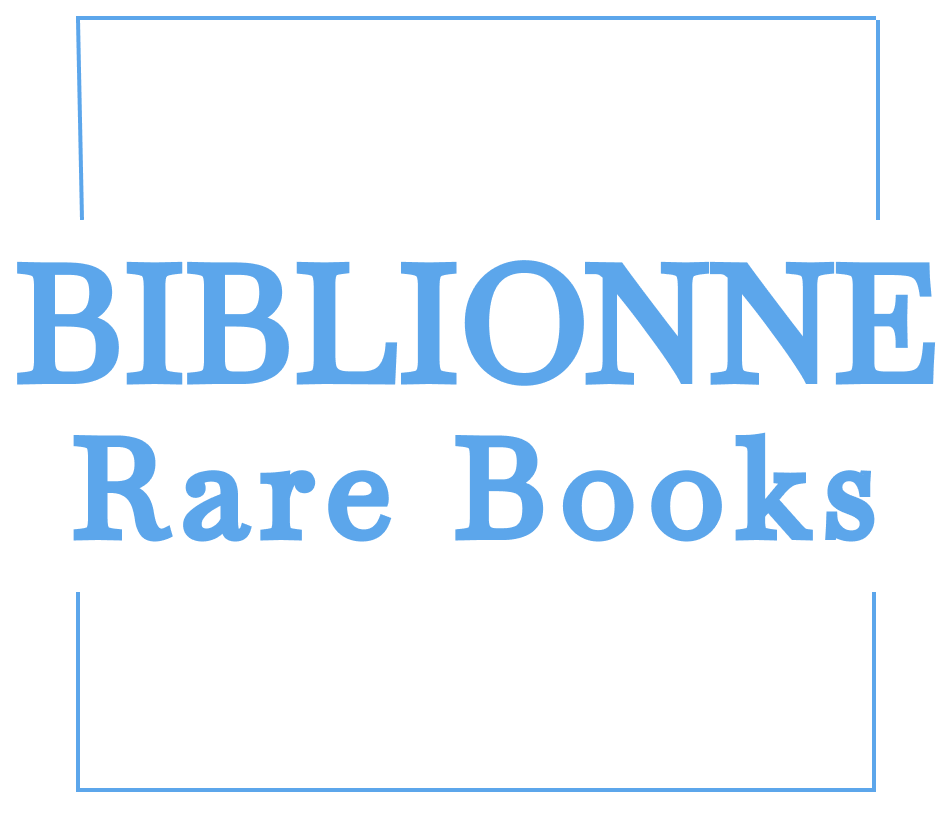Dulsky, P.M.
Kazan Calligrapher Ali Makhmudov. Signed and inscribed by the author.
Kazan Calligrapher Ali Makhmudov. Signed and inscribed by the author.
Couldn't load pickup availability
Dulsky, P.M. [Kazan Calligrapher Ali Makhmudov: (An Essay from the History of Oriental Studies at Kazan University)]. Kazanskii Kalligraf Ali Makhmudov: (Ocherk iz istorii vostokovedeniia v Kazanskom universitete).
Kazan, [Tatpolifraf], 1930.
8vo, 8 pp., 1l.ill.
In original wrappers and modern paper folder. Signed and inscribed to front cover verso. With a small portrait mounted at the top edge only and illustration with a tissue guard.
Near very good condition, slight browning, rust to staples, owner stamp to back cover verso.
Very rare limited edition. Signed and inscribed by the author: ‘Glubokouvazhaemomu / Il'e Samoilovichu / Zil'bershteinu / ot avtora / PD. 1943’ [To the highly respected Ilya Samoilovich Zilberstein from the author. P.D. 1943]. One of 150 copies published.
This is an offprint from the journal 'Vestnik Nauchnogo Obshchestva Tatarovedeniia' ('Bulletin of the Scientific Society for Tatar Studies', No. 9–10, 1930), dedicated to Ali Makhmudov (Muhammad-Galey Makhmudov; 1824–1891), a renowned Tatar calligrapher who taught Arabic calligraphy at the Oriental Faculty of Kazan University from 1843 until the faculty's closure in 1855. He was the only university lecturer of Tatar origin, and his name is associated with the flourishing of the professional Tatar school of calligraphy. The offprint includes a facsimile of a page from a Persian poem in verse, copied by Makhmudov in the taʿlīq script style, which is currently preserved in the National Archive of the Republic of Tatarstan.
This publication is particularly significant as one of the first scholarly studies on the art of Eastern calligraphy among the Kazan Tatars. The transition from the Arabic script to the Latin alphabet in 1928—and later to Cyrillic—led to a decline in Arabic calligraphy. This situation was further exacerbated by the Bolsheviks’ crackdown on Islam. A modest revival of calligraphy began only in the post-war years, though it was highly fragmented and lacked professionalism. A true renewal of Tatar calligraphic art became possible only after the Perestroika, when attitudes toward religion began to change.
The author of this study is Petr Dulsky (1879–1956), an art historian and local historian. Since 1911, he lived in Kazan and dedicated himself to researching the city's architectural monuments, local painting, and graphic arts. On his initiative and under his editorship, 'Kazanskii Muzeinyi Vestnik' ('Kazan Museum Bulletin'), the first Soviet journal dedicated to museum studies, was published. He was one of the founders of the Kazan Circle of Book Lovers and co-editor of its journal 'Kazanskii Bibliofil' ('Kazan Bibliophile').
This copy is inscribed by Dulsky to Ilya Zilberstein (1905–1988), a prominent literary and art critic, public figure, and editor of the multi-volume series 'Literaturnye Pamiatniki' ('Literary Heritage'). Zilberstein was also one of the USSR’s most important collectors. He played a key role in establishing the Museum of Private Collections—now part of the Pushkin State Museum of Fine Arts in Moscow—whose core holdings were based on his personal collection. Zilberstein also contributed significantly to the founding of the Central State Archive of Literature and Art and actively facilitated the return of historical documents and cultural artifacts from abroad and private hands into Soviet state collections and archives.
According to surviving correspondence, in 1943 Dulsky was actively invited to contribute to the preparation of the first volume of 'Khudozhestvennoe Nasledie' ('Artistic Heritage') on the artist Ilya Repin, under Zilberstein’s editorial direction.
We couldn’t trace any copy of this edition in the USA or European libraries via OCLC.






